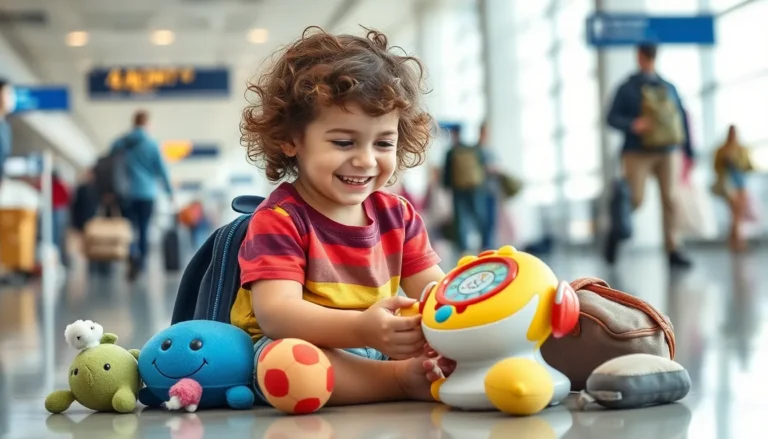Table of Contents
ToggleTraveling with kids can feel like a high-stakes game of Tetris. You want to fit in adventure, fun, and a little sanity, but the pieces don’t always align. So what’s the best age to embark on this chaotic journey? Spoiler alert: it’s not just about how many snacks you can pack or how many times you’ll hear “Are we there yet?”
Understanding Family Travel
Traveling with kids presents unique challenges that vary by age. Parents often find that the enjoyment of travel differs significantly when children are at various developmental stages. Infants and toddlers require extensive preparation, including packing naps and dealing with unpredictable moods. School-age children tend to appreciate the experience more, actively engaging with their surroundings and learning.
Adventurous families might prioritize destinations that cater to both relaxation and activity. Many parks, resorts, and children-friendly attractions facilitate exploration while ensuring safety. Planning an itinerary that balances structured activities with downtime enhances the travel experience. Engaging with travel stories helps children understand cultures better, making them active participants rather than passive observers.
Keeping children entertained during long journeys remains vital. Creative solutions like interactive games or audiobooks can hold their attention. Parents often report that traveling during school breaks leads to less stress compared to off-peak times, as the entire family can share the adventure without academic pressures.
Involving children in the planning process fosters excitement and allows them to voice their opinions. When kids contribute to the destination selection, they may show greater enthusiasm during the trip. Family travel is not just about reaching a destination; it’s about creating lasting memories together and enriching family bonds.
Benefits of Traveling with Kids

Traveling with kids provides unique advantages that enhance family dynamics and personal growth. Families create cherished memories through shared experiences, reinforcing bonds and connecting on deeper levels.
Bonding and Family Time
Traveling offers families quality time away from daily distractions. Shared adventures, from exploring new cities to relaxing on beaches, foster deeper relationships. Engaging in activities together helps parents understand their children’s interests and builds strong emotional connections. Kids also gain valuable insights into family values and teamwork through collaborative decision-making during trips.
Educational Opportunities
Traveling serves as a practical classroom, exposing children to diverse cultures and histories. Visiting museums, historical sites, and nature reserves sparks curiosity about the world. Parents can tailor experiences to align with educational goals, making learning interactive and enjoyable. Children learn about geography, language, and customs while developing critical thinking skills. Engaging with locals enhances their understanding of different perspectives and broadens their outlook on life.
Determining the Best Age to Travel with Kids
Finding the best age to travel with kids involves understanding their developmental stages and travel readiness. Each age group offers unique advantages and challenges.
Infants and Toddlers
Traveling with infants and toddlers presents challenges that often require careful planning. Parents should consider items like strollers, car seats, and baby supplies. Packing essentials creates convenience during travel. Nighttime flights or traveling during nap times often works best. Short trips allow families to gauge their child’s tolerance for travel. Priority should be given to destinations that offer family-friendly accommodations and activities.
Preschool Age
Preschool-aged children are often curious and excited about new experiences. Engaging them with interactive activities enriches their travel experience. Choosing destinations that cater to young children enhances enjoyment. Ensuring a balance between structured activities and downtime helps manage potential meltdowns. Involving children in the planning process can build anticipation. It’s beneficial to select locations with engaging attractions tailored to their developmental stage.
School Age
School-age children frequently display curiosity and eagerness to learn. Traveling with them offers opportunities for educational experiences, such as visiting museums or historical sites. Children in this age group appreciate the chance to engage in activities that challenge them or develop new skills. Encouraging participation in planning nurtures a sense of ownership over their travel experience. Opting for destinations rich in culture fosters their understanding of diverse perspectives.
Teenagers
Teenagers present both challenges and opportunities during family travel. They often desire more independence and can voice preferences about destinations or activities. Engaging them in discussions about travel plans promotes shared experiences. Choosing active or adventure-oriented destinations can spark their interest. Allowing them some freedom within planned itineraries respects their need for autonomy. Activities that foster social interactions, like group tours, can enhance their travel enjoyment.
Tips for Traveling with Kids at Any Age
Traveling with kids requires thoughtful strategies at any age, ensuring a fulfilling experience for the entire family. Focus on planning and preparation, and consider how destinations cater to children’s needs.
Planning and Preparation
Preparation simplifies family travel. Gathering essential items, including snacks and entertainment, makes journeys more manageable. Scheduling travel during off-peak times helps avoid crowds, reducing stress. Booking accommodations with family-friendly amenities proves beneficial, as these often provide comfort and convenience for parents and children alike. Engaging kids in the planning process increases their excitement and investment in the trip. Setting expectations about daily activities and downtime fosters a smoother experience, allowing families to adapt as necessary.
Choosing Destinations
Selecting the right destination enhances the travel experience. Family-friendly locations with a variety of activities cater to kids’ diverse interests. Beaches and national parks offer opportunities for exploration and relaxation, appealing to different age groups. Urban destinations provide educational options, such as museums and historical sites, promoting interactive learning. Including activities suitable for both kids and adults ensures everyone enjoys the adventure. Researching local cultural events adds depth to the experience, enabling families to engage with unique traditions and practices during their travels.
Traveling with kids is a rewarding adventure that fosters family bonds and creates lasting memories. The ideal age for travel varies based on each child’s developmental stage. Whether navigating the challenges of traveling with toddlers or embracing the curiosity of school-age children, thoughtful planning can enhance the experience.
By engaging kids in the planning process and selecting suitable destinations, families can ensure that each trip is both enjoyable and educational. The journey offers opportunities for growth and connection, making every family vacation a chance to explore the world together. Ultimately, the best age to travel is when families feel ready to embark on their adventure, regardless of the destination.







